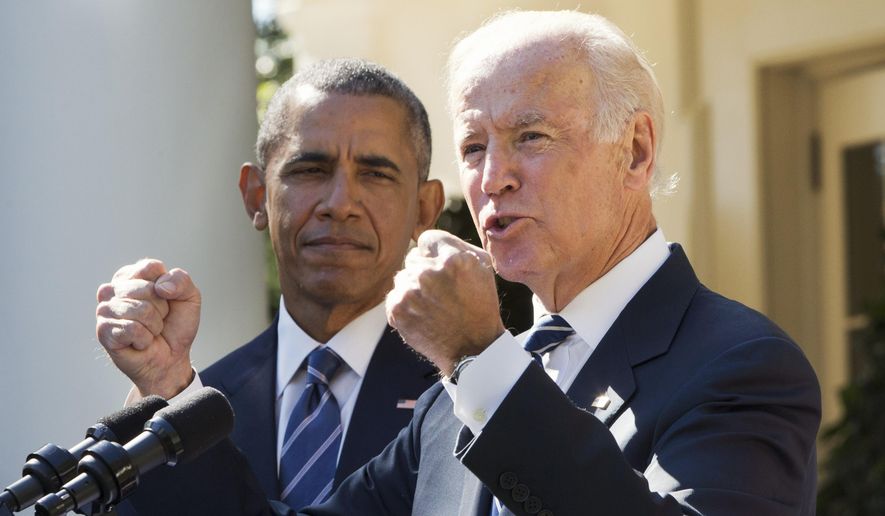A growing of number of prominent Democrats — including Vice President Joseph R. Biden — have jumped aboard the free-college-for-everyone bandwagon in recent months, but the party’s loudest, most influential voice remains conspicuously silent and has yet to fully throw his weight behind an issue that has quickly become a rallying cry for liberals.
Although President Obama has proposed two years of free community college for all Americans, he hasn’t joined Democratic presidential candidates Hillary Rodham Clinton, Sen. Bernard Sanders and former Maryland Gov. Martin O’Malley in calling for four years of debt-free higher education for all.
White House officials say Mr. Obama believes a college degree should be “universal,” but they stop short of saying the president backs any of the proposals his potential successors have put on the table. Administration officials acknowledge, however, that they are more than happy to see Mrs. Clinton, Mr. Sanders and Mr. O’Malley promoting higher education platforms that go beyond what Mr. Obama has discussed.
But the president’s reticence to speak directly about debt-free college has left liberal leaders anxious, and they say they are eagerly awaiting his full-throated support for the idea.
Mr. Obama’s handling of free higher education even puts him at odds with Mr. Biden, who used a Rose Garden speech last week to say that four years of college should be offered to all Americans just as 12 years of high school is today. The vice president’s remarks were unexpected because his core reason for addressing the nation was to explain why he wouldn’t seek the White House next year.
Some analysts say the White House — and liberal leaders — likely realize that it’s politically wise for the president to remain in the background and allow his potential successor to take the lead on such issues and, in the process, make the case to voters of being more progressive than Mr. Obama on key issues.
“At some point, the party would like the president to cede some of these initiatives to the candidates running. It would be smart for the White House to step aside and let somebody else carry the water on this one,” said Brandon Rottinghaus, a political science professor at the University of Houston who has written on presidential leadership.
He argued that the administration also doesn’t have the time to devote to such a major policy change.
“This is an initiative which would require input from multiple levels of government. It would require partnerships across individual states. This is the kind of thing that, in terms of policy, is hard to manufacture in a short period of time,” Mr. Rottinghaus said.
The notion of free college for all, while popular with liberals, would be incredibly expensive. Mr. Sanders’ plan, for example, could cost as much as $750 billion over 10 years, according to some estimates.
The high price tag — and the unlikelihood that such a costly proposal could gain any traction in Congress — are key reasons Mr. Obama hasn’t fully pushed the idea, some analysts say.
That didn’t stop Mr. Biden from embracing the concept.
“We need to commit to 16 years of free public education for all our children,” he said in his Rose Garden speech two weeks ago. “We all know that 12 years of public education is not enough.”
Mr. Obama, on the other hand, has dodged the question. At a town hall meeting in September, he was asked whether it was realistic for the U.S. to provide four years of free higher education for everyone.
Rather than come out in support of the idea, he pivoted back to his free community college proposal, saying it represents an appropriate and necessary first step.
Americans “who are thinking about a four-year college education, they can also get their first two years at the community college, then transfer those credits to a four-year college, and they’ve just cut their overall college costs in half. So it would be good for everybody, whether you’re going two years or four years,” the president said. “Now, if we can get that done, then I think we can start building from there.”
The White House said Mr. Obama believes all Americans should have affordable access to college education, but administration officials acknowledge that they aren’t pushing the kinds of plans Mr. Sanders, Mrs. Clinton and Mr. O’Malley are talking about.
“The president has talked about how a college degree should be as universal as a high school diploma is now. In terms of the mechanics for getting there, our emphasis is on these two years of [free] community college,” a White House official said.
Meanwhile, liberal leaders want Mr. Obama to lead the party on higher education policy during his remaining time in office.
“The president should come out in favor of [free college] in part because it is something all the major presidential candidates are proposing,” said Neil Sroka, a spokesman for the liberal political action committee Democracy for America. “I think it would be helpful to have the president out there on it. Frankly, this is an issue for the future of the Democratic Party.”
• Ben Wolfgang can be reached at bwolfgang@washingtontimes.com.




Please read our comment policy before commenting.